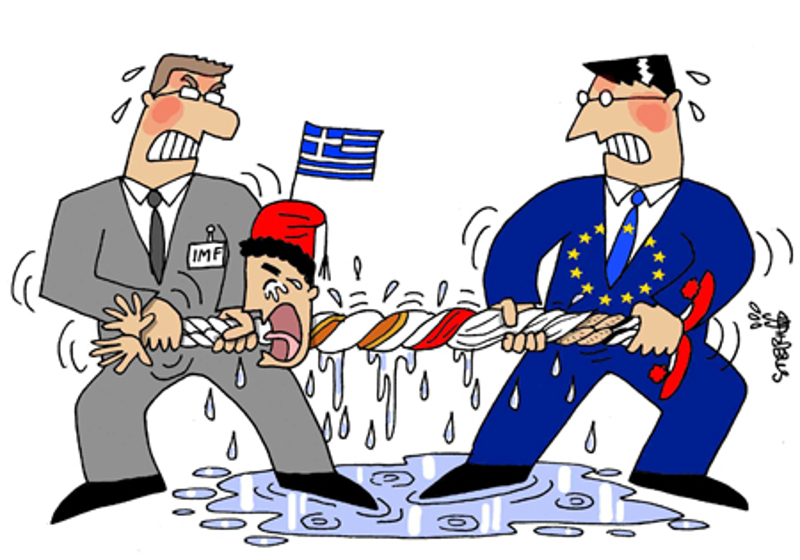
The EU instills the state of emergency: Economic Growth at All Costs.
by Francois Zammit
Image by Isles of the Left
[dropcap]T[/dropcap]he last months have been characterised by a continuous stream of articles and commentaries about the possibility of corrupt practices in Malta and the shadowy manner that Malta is sustaining its economic growth. The prime targets of this scrutiny are the financial services being offered by our island state and controversial initiatives such as the Individual Investor Programme (IIP) which has been dubbed as the selling of Maltese passports and citizenship. Critics of this state of affairs have also called on the EU institutions to monitor and block this economic initiatives, but will their pleas be heard?
Independently of my views on the financial initiatives being setup by consecutive Maltese administrations to attract direct foreign investment and increase national revenue, I have serious quandaries on the current narrative that the EU should be looked upon as the saviour of good governance and good financial practice. Inasmuch as the EU may offer some form of safeguarding, it is also true that most European countries have not always acted in the most ethical way themselves, not to mention that many individuals, who held positions of power within the EU institutions, often did not represent good governance. For democracy to function properly, we need to be vigilant and critical of what states like Malta do, yet we must not do so by setting blinkers that make us ignore the sins of our supposed guardian angels.
[beautifulquote align=”left” cite=””]our critique of corruption and corrupt practices needs to go beyond looking only at the individual cases and misdemeanours[/beautifulquote]
To clarify: I am not a Eurosceptic, but having said that, I am highly critical of the manner in which EU institutions have been functioning, as well as of the hidden interests of individuals who are setting the European agenda. The central claim that I am positing here is that our critique of corruption and corrupt practices needs to go beyond looking only at the individual cases and misdemeanours. Firstly, we need to look into the conditions that allow for corruption to happen, and secondly, we need to consider the operating discourse that enables various administrations to flog their financial initiatives to their electorate.
Democratic Deficit within the EU Commission

When the infamous tobacco scandal involving the then EU commissioner John Dalli hit the headlines, many were quick to accuse him and Silvio Zammit for attempting to make this corrupt deal. Without going into the merits and specific details of the case, there was an outstanding negligence in the manner that the media investigated and commented on the case. Very few commentators in Malta or elsewhere dared to question how this backroom dealing was even possible within the walls of the EU Commission. Many have failed to question the role of lobbying within the EU and how corporations and industries have the financial clout to reach to the European decision-makers and to influence the legislative process within the EU.
[beautifulquote align=”left” cite=””]Google has spent over five million euros on lobbying, and Goldman Sachs – around a million euros.[/beautifulquote]
A quick look at sources like lobbyfacts.eu or integritywatch.eu allows a glimpse at the large quantities of money spent by corporations and business associations on lobbying of MEPs and EU Commissioners. According to the latest data, Google has spent over five million euros on lobbying and Goldman Sachs – around a million euros. This capital gives corporations the kind of access to policy makers that is not, even remotely, available to the electorate and to the man in the street. I am not arguing that all lobbying results in cases of corruption or that only the interests of large corporations take precedence. However, such scenarios do have the potential and possibility for EU politicians and policy makers to place themselves in a dangerous predicament.
Whereas direct financing and the transfer of money is considered unethical and verging on the corrupt, there are also other practices allowed by the EU, like revolving door positions, that should be scrutinised and even discouraged. In the political context, the revolving door is having legislators and regulators to become representatives or advisers of the industries and corporations that are regulated by those same legislations and regulations which they have helped to set up in the first place. Some of the most clamorous of these cases involved Gunter Verheugen in 2010, Siim Kallas in 2015, and Jose Manuel Barroso in 2016.
Barroso’s case caused an outcry throughout Europe and many have been critical of the flagrant double standards illustrated by such a case. From outgoing president of the European Commission, Barroso found himself in the position of Chairman of Goldman Sachs International. This means that he is advising them on the very regulations that were set up or proposed during his presidency. This behaviour may not be illegal or necessarily corrupt but it does cross political boundaries that highlight a grave democratic and transparency deficit. As mentioned in the case of corporate lobbying, such clamorous cases of revolving door practices outline the closely knit relationship that exists between legislators and the corporate world, thus placing into question the integrity of European politicians and the institutions they represent.
[beautifulquote align=”left” cite=””]Before the EU can act as an arbitrary of local political shadiness it needs to first and foremost ensure that its own house is clean.[/beautifulquote]
Considering that the foundation of good governance should be objectivity and separation of powers, one starts to have deep misgivings about whose interests are being protected by the EU Commission, when so many of its members are being rewarded with lucrative jobs and positions. There are also no clear guarantees that people like Verheugen and Barroso will not utilise their personal contacts and influence to affect regulatory boards and decisions that may affect their new paymasters. May I add here that these specific instances involving high profile European figures is reminiscent of very similar cases involving Maltese politicians and their close knit ties to local and foreign companies. Before the EU can act as an arbitrary of local political shadiness it needs to first and foremost ensure that its own house is clean.
The State of Emergency: Economic Growth at all Costs

Barroso has been the main target of my critique because he may be also considered as the man who has shaped the economic and political discourse of the EU for the last decade. As President of the European Commission from 2004 till 2014, he was in a position to set the economic agenda and was one of the main figures who forced austerity measures on Greece and other weaker European economies. His new position with Goldman Sachs shows a cruel irony that was duly noted by the media and other EU staff members:
The petition drafted by EU staff alleged their former boss had broken the code by working for a bank that was implicated in the global financial crash and the Greek debt crisis, thus sullying the reputation of the entire European project at a time when it was rocked by the vote for Brexit.
During the Greek debt crisis, Barroso represented the hardliners who forced Greece into a corner and made the Greek state agree to dire economic measures that included privatisation of state assets, increased taxation on the population and cost-cutting to the welfare state. The narrative promoted by the Barroso administration made economic growth at all costs the principle by which European states should run their budgets. When economic growth becomes the sole priority, all measures enacted towards achieving that goal become justified. In times of crisis all is allowed.
Philosophers Walter Benjamin and Giorgio Agamben explored the manner in which the states of emergency like insurrections and war justify the need to enact laws that may be deemed as unconstitutional and in breach of the rights of the citizens. Following the 2008 economic crisis, the dominating discourse has been that the economy should be treated like any other crisis, be it a military crisis or a natural disaster. By claiming that the state needs to do everything in its power to defend itself from a financial crisis and guarantee economic growth, new measures can be enacted so as to ensure ‘economic health’.
[beautifulquote align=”left” cite=””]In the same way that in total war, the whole population has to make sacrifices for the war effort, during a financial crisis everyone is expected to make sacrifices for the economic effort.[/beautifulquote]
In a state of emergency, everything deemed necessary to succeed in these takes primacy over all other considerations, including individual rights and the living conditions of the population. In the same way that in total war, the whole population has to make sacrifices for the war effort, during a financial crisis everyone is expected to make sacrifices for the economic effort. Following this dominating narrative, the IMF and the EU have forced countries like Greece to make cuts in pensions, national infrastructure and social benefits. When population is placed under a constant state of fear or danger, they are preconditioned to accept their sacrifices as necessary.
In our current state of affairs, the general population is made to fear the possibility of an economic downturn. Thus to guarantee a more certain future, job security and wealth, politicians have succeeded in justifying all sorts of measures – unethical or legally questionable – by referring to them as a means of ensuring economic stability. This narrative has dominated European and Western politics for the last decade and has also been adopted by the Maltese government as a means of making the electorate accept new budgetary measures that allow developers and foreign investors to make a killing.
[beautifulquote align=”left” cite=””]The way Greece was treated by the EU has created a paradigm of fear among the people, making them accept anything in the name of economic growth and including their own individual fate.[/beautifulquote]
It is in this light that we need to assess whether the European Union truly offers an alternative to the questionable practices that have been dominating the local news. It may be argued that it was the EU that has offered the most effective instrument enabling the governments to partner with the business world and promote a pro-business attitude that serves the few over the needs of the many. The way Greece was treated by the EU has created a paradigm of fear among the people, making them accept anything in the name of economic growth, including their own individual fate. States of emergency have been used by democratic states to act as totalitarian regimes. What we are experiencing nowadays is a narrative that allows for the possibility of capitalist totalitarianism, which, in a sense, is not unlike the economic measures enacted by totalitarian regimes like the agrarian reforms during Stalin’s and Mao’s regime. Whereas in the past it all was justified in the name of political ideology, presently it is done in the name of promoting business and capitalist growth. Ultimately, the same logic that informed past ideologies also underlies the current political practices to such an extent that it may be stated that capitalism is the new universal ideology.

I think that the European Commission was founded with a different set of priorities therefore if we are getting a different impression we need to ask ourselves or themselves why we are getting this impression right?